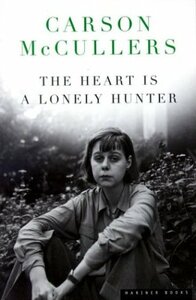You need to sign in or sign up before continuing.
Take a photo of a barcode or cover
This book was as much a novel about racism and oppression as it was a personal, coming of age story. McCullers' writing style is simple yet effectively sets the novel's tone, one which languishes in the heat of the deep South and longs, interminably, for something more.
I have no idea how McCullers wrote this book at the age of 23. To so keenly funnel what she was witnessing around her into a book that evokes the hopelessness of knowing the truth about capitalism and exploitation yet manages to find space for a bittersweet sense of hope... whew!
I have no idea how McCullers wrote this book at the age of 23. To so keenly funnel what she was witnessing around her into a book that evokes the hopelessness of knowing the truth about capitalism and exploitation yet manages to find space for a bittersweet sense of hope... whew!
I actually found this book laying on the ground when I was at the Dave Matthews concert in Central Park back in 2003. It didn't look like anything that would interest me, but I figured it was a sign that I found it, so I decided to read it.
I am very glad that I did, because it was a great book. Although it is more likely the kind of book you would find being taught at a college than anyone reading at the beach, it was a really good story about life in small-town America in the 1930s.
This reminded me in a weird way of Sherwood Anderson's [b:Winesburg, Ohio|80176|Winesburg, Ohio|Sherwood Anderson|http://d202m5krfqbpi5.cloudfront.net/books/1170979482s/80176.jpg|191520] (which I have read selections from, but not entirely).
I am very glad that I did, because it was a great book. Although it is more likely the kind of book you would find being taught at a college than anyone reading at the beach, it was a really good story about life in small-town America in the 1930s.
This reminded me in a weird way of Sherwood Anderson's [b:Winesburg, Ohio|80176|Winesburg, Ohio|Sherwood Anderson|http://d202m5krfqbpi5.cloudfront.net/books/1170979482s/80176.jpg|191520] (which I have read selections from, but not entirely).
challenging
dark
emotional
reflective
sad
medium-paced
Plot or Character Driven:
A mix
Strong character development:
Complicated
Loveable characters:
Yes
Diverse cast of characters:
Yes
Flaws of characters a main focus:
Yes
Someone recommended this book because I appreciated Flannery O’Connor, and it did not disappoint. McCullers’ style differs from O’Conner, but captures southern voices equally well, and exposes her characters’ flaws in devastating ways.
Loneliness and longing seem to be the central themes, but I’d also say it speaks to having the ability to be attentive to those around you. Not just listening, but giving empathetic space to understand the perspectives of others if truly desiring to make meaningful connections. The characters seemed like they were agonizingly close to making those connections, but their own hardheadedness seemed to be an insurmountable wall. In a strange way, the story mirrors the epidemic of loneliness our current society is undergoing, with people guarding their beliefs so tightly, isolating themselves in distant corners.
Each of these interactions drove the story forward for me. The characters were the point, and John Singer being the figure that all the others seem to orbit around. Singer, a deaf mute man, was a sounding board for each of them. They would ramble on with their particular agendas and fascinations while he politely listened. The story seemed to be about this season with Singer, starting with him, and ending with him, as if all the characters converged on the man and their own lives stopped when he showed up. Singer’s silence was like an illusion, a fill-in of self affirmation and acceptance in which they poured all of their hopes, cutting themselves off from everyone else. There was one moment when all the central characters were in Singer’s room. The tension between them felt stifled and awkward, but their individual focus on their elevated perception of Singer highlighted their stubborn unwillingness to really see each other.
Singer himself, no different from the others who seemed to worship him, struggled with the same longing to make meaningful connections. His friendship with Spiros seemed to mirror the relationships that the other characters had with him.
The vast range of issues, themes and perspectives McCullers covers through the novel is immense. I find it so remarkable that she can write about these things with believable immersion despite being only in her early twenties. I’m most impressed with her treatment of Blount, Dr. Copeland and Singer himself, all older men with vastly unique life experiences. The depth at which she crafts their voices, thoughts, felt believable. Again, to me, it’s a stunning feat considering the stark differences between each character and herself as a young woman.
Although there are obvious signs of the times (references to Hitler’s aggression in Europe, cost of goods, Nehi, Woolworth’s, etc.), the story and its characters didn’t feel distant. McCullers’ plain language helped bridge that gap, I think, and that plain narrative voice helped in connecting to the region and the simple nature of the people (besides Dr. Copeland, whose oration felt more sophisticated). I didn’t find that to be a distraction, even in times where she’d use weak adverbs like, “She was very sad,” seemed to make perfect sense for each character.
Mick’s character felt the most authentic, and I imagine that’s because McCullers is drawing on her own experiences to craft her story, dwelling on Mick’s inner world with more interest and nuance than any other character. Although Mick was under the same spell regarding her relationship with Singer; her coming of age, her deeply felt connection to music and longing to be a successful musician were winsome, and I found myself rooting for her. Each of her vignettes felt vivid, as did her discontentment and the angst in which it was expressed…
“She sat with her arms around her legs, biting her salty knee very hard. The whole world was this symphony, and there was not enough of her to listen... Now that it was over there was only her heart beating like a rabbit and this terrible hurt.”
There was also something endearing and familiar in the sweet and antagonistic relationship she had with her younger brother (Bubber/George). The pseudo rivalry and moments of protective concern, looking out for his innocence and whimsical nature, oscillated in natural ways.
Overall, McCullers’ ability to juggle all these perspectives, personalities, voices and themes speaks to an instinct that goes beyond her ability as a writer. Her ability to see the world in such a broad way is a gift and a curse. She has an intuition to see and understand others, but the curse is that she likely experiences the same unreciprocated longing to be understood.
If you’re a fan of O’Conner and other southern gothic writing, “The Heart is a Lonely Hunter” is compelling and will leave you pondering its themes in similar ways. I’m looking forward to engaging with more of McCullers’ work.
I was really surprised when I saw how old this book was. For somthing written in the 1940s the characters felt extremely real. The poverty, the loneliness and their inability to reach out for love or to better their predicament without dulling their passion. Each character invokes and emotion when reading it and their views on the world are still relevantly which in a way makes their sadness really stare out the books. 80 years on a lot of the things they speak about having to fight agains don’t feel in much a better place.
All in all a really good read and as far as character building goes it’s one of the better books I’ve read.
All in all a really good read and as far as character building goes it’s one of the better books I’ve read.
dark
reflective
sad
tense
medium-paced
Plot or Character Driven:
Character
Strong character development:
Yes
Loveable characters:
Yes
Diverse cast of characters:
Yes
Flaws of characters a main focus:
Yes
Graphic: Racism, Violence
Moderate: Ableism, Suicide
challenging
dark
emotional
reflective
sad
slow-paced
Plot or Character Driven:
Character
Strong character development:
No
Loveable characters:
Complicated
Diverse cast of characters:
Yes
Flaws of characters a main focus:
Complicated
“The whole world was this music and she could not listen hard enough…Wonderful music like this was the worst hurt there could be. The whole world was this symphony and there was not enough of her to listen.”
چند وقتی بود که احساس میکردم آوازهی مک کالرز توی جامعه کتابی ایران پیچیده. شاید هم نه و این فقط احساس من بود. اما با چاپ دوباره این کتاب از نشر بیدگل، تصمیم گرفتم برم سراغش و برای یک بار هم که شده قلم مک کالرز رو امتحان کنم و بفهمم که آیا داستان آمریکایی میتونه تحت قراره بده منو یا نه؟
خوشبختانه، گیرایی قلم مک کالرز و طوری که روی صفحات کاغذ جاری میشد قسمت لذتبخش خوانش برای من بود. داستانی که با دوستی دو مرد لال شروع شد و از اونجا به بعد راجع به موجی بود که با خودشون آوردن، به تنهایی قابل تامل بود. داستان نفرت پراکنی، تبعیض نژادی و اشارات به مذهب که هرکدوم قابل بحث بودن.
با این حال، با تمام محاسن و زیباییهای داستان، سینگر برای من عزیزترین شخصیتش باقی میمونه و جدا از اینکه ارتباط برقرار کردن با ادبیات آمریکا برام سخته، خوانش قلب شکارچی تنها اصلا سخت نبود. درسته طرفدار پر و پا قرص مک کالرز نشدم و انگار روحم با ادبیات آسیایی پیوند عمیقتری رو شکل داده اما دوست دارم باقی کارهای این نویسنده رو هم بخونم. کلمات و نحوهی روایتش خیلی جادویی و نرمه. و من این حسی که توی قلمش موج میزنه رو، واقعا دوست دارم.
خوشبختانه، گیرایی قلم مک کالرز و طوری که روی صفحات کاغذ جاری میشد قسمت لذتبخش خوانش برای من بود. داستانی که با دوستی دو مرد لال شروع شد و از اونجا به بعد راجع به موجی بود که با خودشون آوردن، به تنهایی قابل تامل بود. داستان نفرت پراکنی، تبعیض نژادی و اشارات به مذهب که هرکدوم قابل بحث بودن.
با این حال، با تمام محاسن و زیباییهای داستان، سینگر برای من عزیزترین شخصیتش باقی میمونه و جدا از اینکه ارتباط برقرار کردن با ادبیات آمریکا برام سخته، خوانش قلب شکارچی تنها اصلا سخت نبود. درسته طرفدار پر و پا قرص مک کالرز نشدم و انگار روحم با ادبیات آسیایی پیوند عمیقتری رو شکل داده اما دوست دارم باقی کارهای این نویسنده رو هم بخونم. کلمات و نحوهی روایتش خیلی جادویی و نرمه. و من این حسی که توی قلمش موج میزنه رو، واقعا دوست دارم.
emotional
reflective
slow-paced








